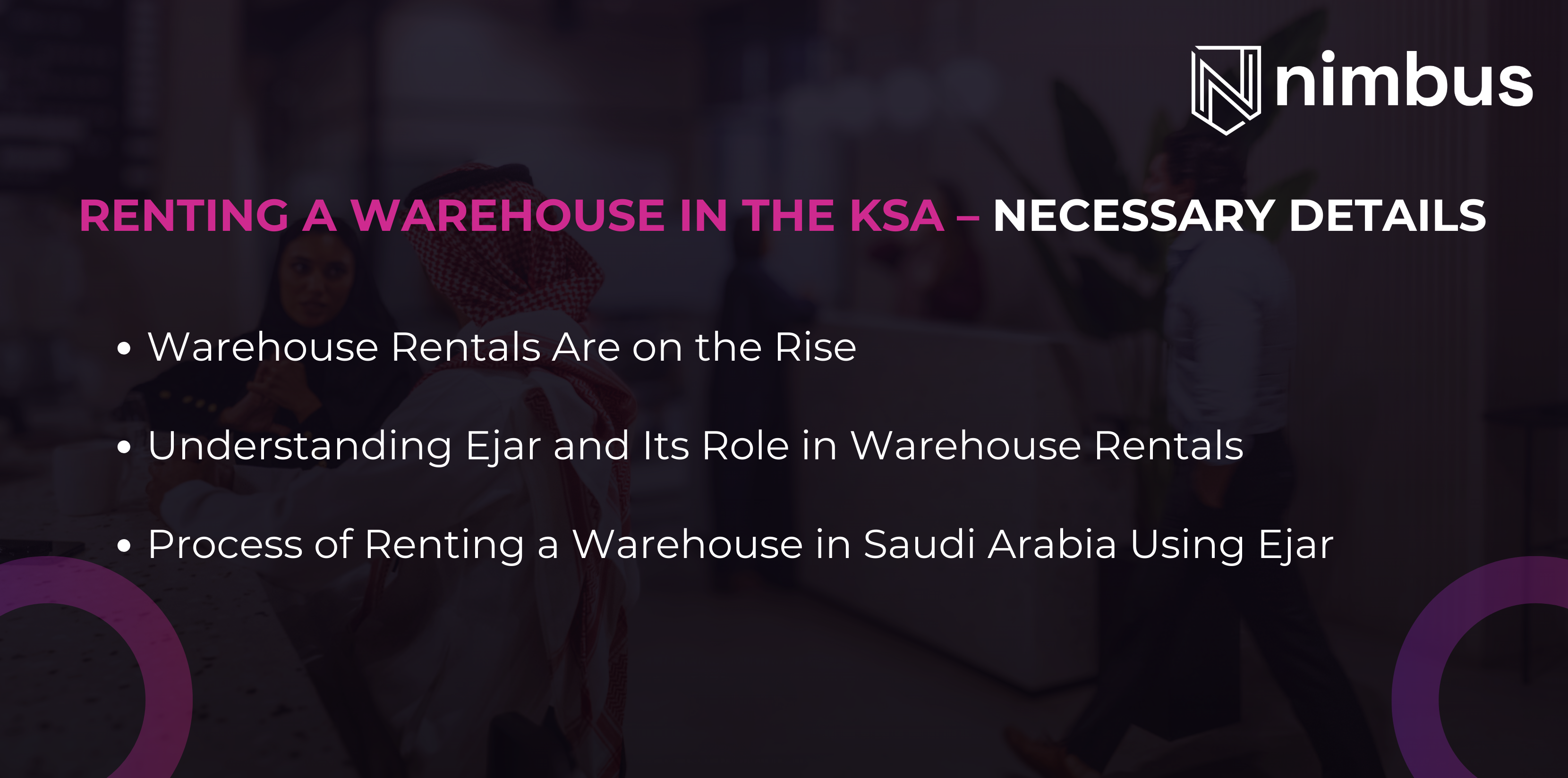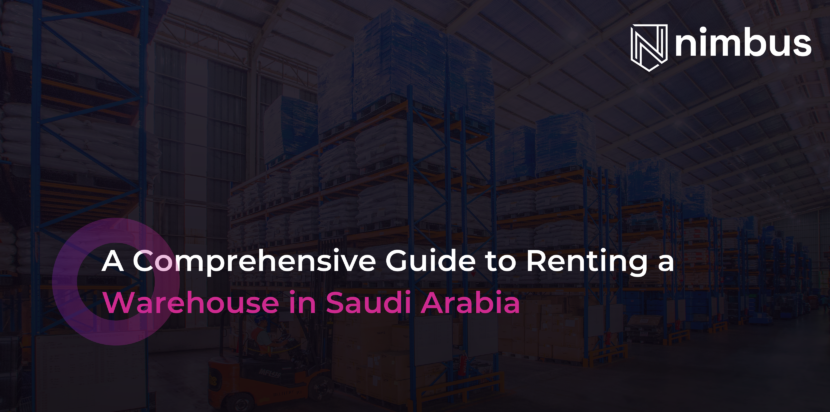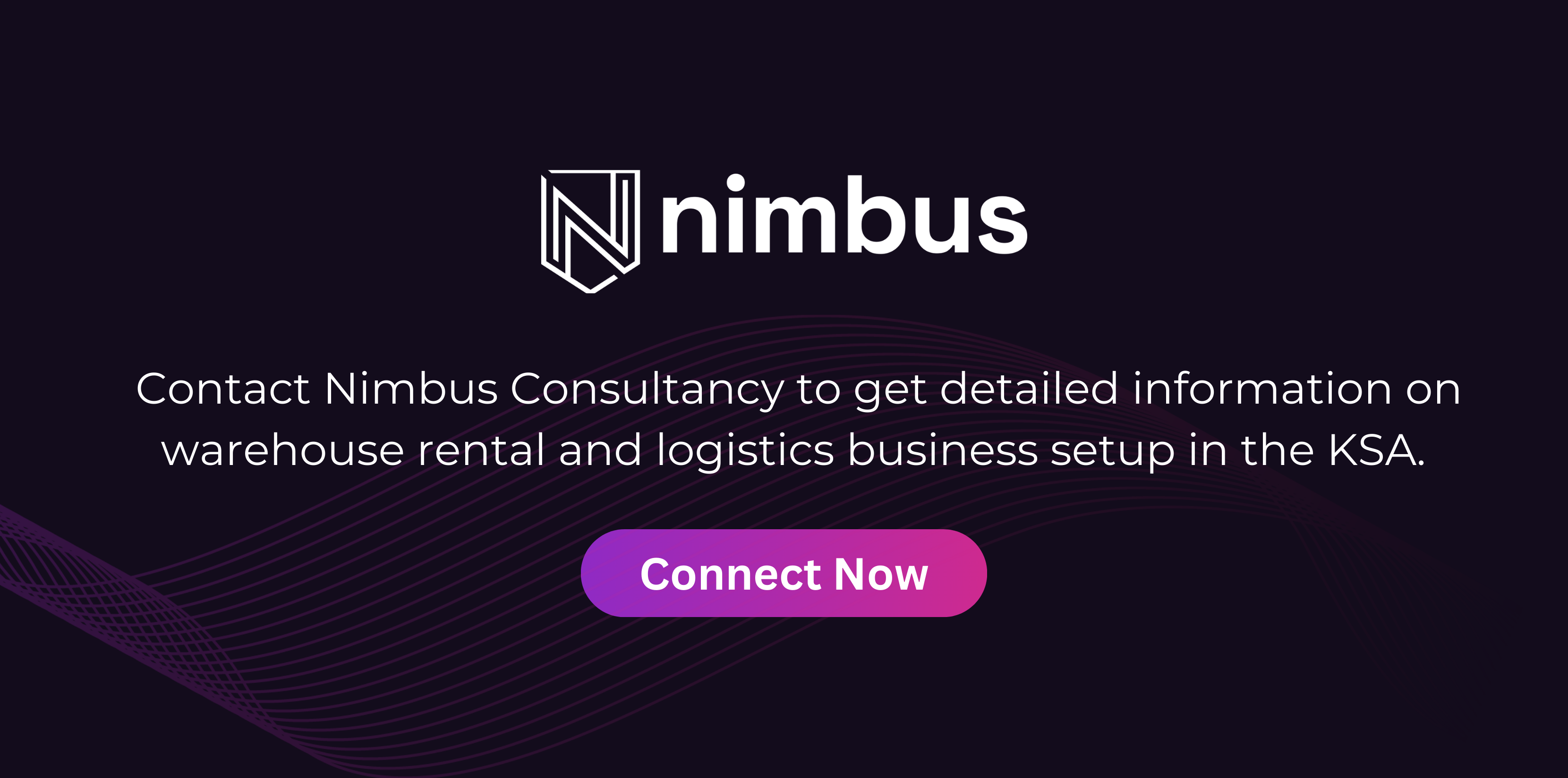Saudi Arabia’s rapidly expanding economy has made it a magnet for enterprises and startups looking for business incorporation in the KSA. One key sector witnessing significant growth is commercial real estate, particularly warehouse rentals.
As businesses seek to optimize supply chains and reduce operational costs, the demand for warehouse space in major cities like Riyadh, Jeddah, and Dammam has surged.
With the Saudi warehousing market projected to grow at a 4.5% CAGR, reaching a market size of $13.2 billion by 2030, securing a warehouse in the Kingdom has become a strategic priority for businesses in retail, e-commerce, and logistics.
If you’re planning to rent a warehouse in Saudi Arabia, understanding the leasing process, documentation requirements, and legal framework is crucial. This post highlights how businesses can efficiently rent warehouse space.
RENTING A WAREHOUSE IN THE KSA – NECESSARY DETAILS

– Warehouse Rentals Are on the Rise
Saudi Arabia’s business-friendly reforms and economic diversification efforts have contributed to a strong demand for warehouse space. Here are some key drivers behind this trend.
- Booming E-commerce and Retail Sector: As online shopping gains momentum, businesses require well-located warehouses for inventory management and distribution.
- Expansion of Logistics and Supply Chain Networks: Companies are investing in warehouse infrastructure to enhance efficiency and reduce operational costs.
- Government-Backed Digitalization: Platforms like Ejar simplify commercial leasing, making it easier for businesses to secure properties legally and efficiently.
– Understanding Ejar and Its Role in Warehouse Rentals
Ejar is an electronic leasing system launched by the Saudi Ministry of Municipal and Rural Affairs and Housing. It aims to streamline the property rental process by offering:
- A secure and transparent contract system that aligns with Saudi regulations.
- Protection for both landlords and tenants through standardized leasing agreements.
- An integrated payment system that ensures financial security for both parties.
By using Ejar, businesses can efficiently lease warehouse spaces without the complexities of traditional leasing methods.
– Process of Renting a Warehouse in Saudi Arabia Using Ejar
To rent a warehouse, businesses must follow a structured process to ensure compliance with Saudi laws and secure a suitable lease agreement. Here are the main steps.
Step 1: Prepare and Submit Required Documents
Before leasing a warehouse, the renting company must provide essential documents to the landlord. These include:
- An active Ejar account registered under the General Manager’s (GM) Iqama number. This confirms the company’s legal presence on the platform.
- Commercial Registration (CR) to verify the company’s legitimacy and eligibility to conduct business in Saudi Arabia.
- Articles of Association (AoA) outlining the company’s structure, purpose, and internal regulations.
- Copy of the GM’s Iqama or ID to verify the identity of the authorized representative.
- Absher number registered under the GM’s name in Ejar to ensure synchronization with government records.
- VAT number (if applicable) for companies engaged in taxable business activities.
In some cases, the landlord may also need to provide their VAT registration, Zakat registration, and Commercial Registration (CR) for audit purposes.
Step 2: Contract Creation and Submission via Ejar
Once the landlord verifies the provided documents, they will:
- Draft a rental contract through the Ejar system.
- Submit the contract to the tenant’s Ejar account for review.
This step ensures that all legal and regulatory requirements are met before finalizing the lease agreement.
Step 3: Review and Accept the Rental Contract
Upon receiving the contract, the renting company must:
- Carefully review the terms and conditions via the Ejar system.
- Negotiate any necessary changes with the landlord before acceptance.
- Electronically accept the contract if the terms are satisfactory.
If there are discrepancies or required modifications, the tenant can reject the contract and request revisions before finalizing the agreement.
Step 4: Payment Options and Processing
After contract acceptance, the payment process begins. Businesses can choose between:
- Ejar system payments: Payments processed through Ejar take 5-10 days before being received by the landlord.
- Direct bank transfers: Some landlords prefer bank transfers for faster processing. The necessary banking details should be coordinated directly with the landlord.
Maintaining records of all transactions is crucial for auditing and compliance purposes.
Important Considerations for Renting a Warehouse in Saudi Arabia
While the Ejar platform streamlines the leasing process, businesses should consider additional factors to ensure a smooth rental experience.
1. Keep Records of All Agreements and Transactions
Maintaining detailed records of contracts, payments, and communications with the landlord is essential for future reference and potential audits.
2. Understand the Legal Implications of the Lease
Ensure that the contract specifies key details like:
- Warehouse specifications (size, facilities, and location).
- Lease duration and renewal terms.
- Payment installments (if applicable).
- Completion date (if the warehouse is still under construction).
3. Comply with Industry-Specific Regulations
Certain industries may require additional licenses or approvals for warehouse operations. Businesses should verify compliance with Saudi regulations specific to their sector before leasing a warehouse.
Why Businesses Should Leverage Ejar for Warehouse Leasing?
Ejar is more than just a digital leasing platform; it is a critical tool for businesses looking to secure commercial properties in a legal, structured, and efficient manner. The system offers:
- Faster leasing transactions with minimal paperwork.
- Legal protection for both tenants and landlords.
- Integrated financial services for secure payments.
- Easy contract management through an official government platform.
Renting a Warehouse in Saudi Arabia the Smart Way
As Saudi Arabia cements its status as a regional business hub, companies must navigate the commercial leasing process strategically. Whether going for supply chain company formation or optimizing logistics, securing the right warehouse space is a key business decision for business setup in Saudi Arabia.
By leveraging the Ejar system, businesses can simplify transactions, ensure compliance, and streamline payments, all while benefiting from a transparent leasing process.
For companies planning to enter or expand in Saudi Arabia, acting now to secure warehouse space in high-demand cities like Riyadh, Jeddah, and Dammam could be a game-changer.



